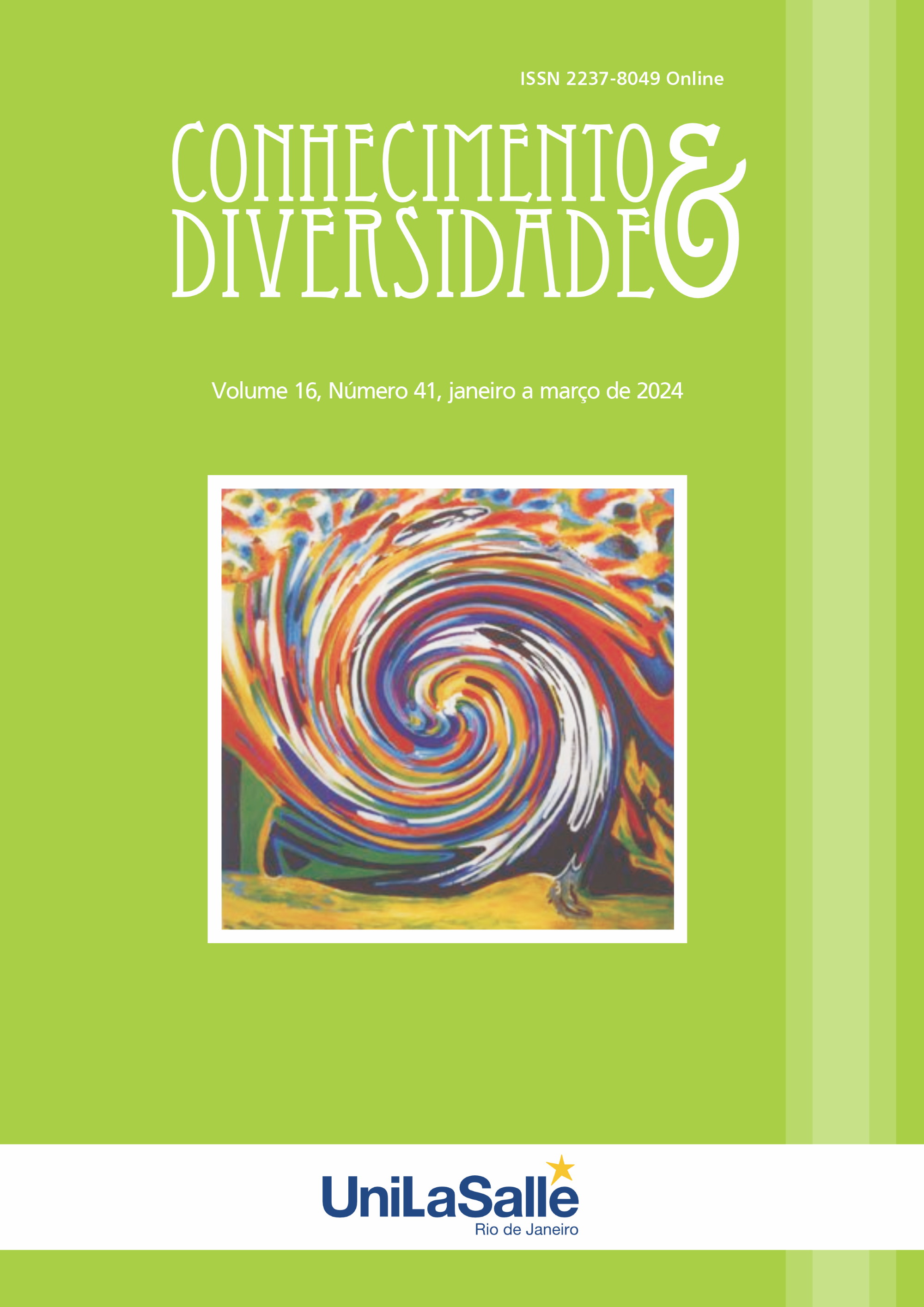DESENVOLVIMENTO DE SISTEMAS INTELIGENTES PARA A AVALIAÇÃO AUTOMÁTICA DOS RESULTADOS ACADÊMICOS DOS ESTUDANTES
DOI:
https://doi.org/10.18316/rcd.v16i41.11437Palavras-chave:
inteligência artificial, participantes no processo educativo, automatização, objetividade, problemasResumo
Objectivos: analisar o desenvolvimento de sistemas de inteligência artificial para a avaliação automática dos resultados de aprendizagem dos alunos. Metodologia: para atingir este objetivo, foram utilizados os métodos científicos de análise e síntese, análise de conteúdo, análise SWOT, comparação e tipologia. Resultados: foi estabelecido que, entre as principais vantagens, se encontra um aumento significativo da objetividade da avaliação dos conhecimentos e competências dos alunos. É importante ter em conta a aceleração do processo de verificação dos resultados, o que poupa tempo e esforço aos professores. Outra vantagem importante é o fornecimento de feedback em tempo real durante a avaliação. Novidade científica: Foi estabelecido que um dos principais problemas é a possibilidade de parcialidade e desigualdade no sistema educativo. Dado que os sistemas inteligentes se baseiam em determinados algoritmos, qualquer enviesamento ou informação falsa nos dados iniciais pode conduzir a resultados tendenciosos. Outros desafios incluem a excessiva mecanização do processo de avaliação, que nem sempre tem em conta as características individuais de cada aluno, bem como a garantia de uma proteção adequada dos dados pessoais. Conclusões: Os sistemas inteligentes de avaliação dos alunos são uma ferramenta poderosa para combater os esquemas de corrupção no sistema educativo, especialmente nos países em desenvolvimento.
Referências
AJAMI, Riad A.; KARIMI, Homa A. Artificial intelligence: opportunities and challenges. Journal of Asia-Pacific Business, p. 1-3, 2023. Available at: https://doi.org/10.1080/10599231.2023.2210239
ALAM SHER MALIK. Digital technology, artificial intelligence, and future of medical education. Journal of University Medical & Dental College, v. 12, n. 2, p. 4-5, 2021. Available at: https://doi.org/10.37723/jumdc.v12i2.622
ALAM, Ashraf. Employing Adaptive Learning and Intelligent Tutoring Robots for Virtual Classrooms and Smart Campuses: Reforming Education in the Age of Artificial Intelligence. У: ALAM, Ashraf. Lecture Notes in Electrical Engineering. Singapore: Springer Nature Singapore, 2022. p. 395-406. ISBN 9789811929793. Available at: https://doi.org/10.1007/978-981-19-2980-9_32
BAGUNAID, Wala; CHILAMKURTI, Naveen; VEERARAGHAVAN, Prakash. AISAR: Artificial Intelligence-Based Student Assessment and Recommendation System for E-Learning in Big Data. Sustainability, v. 14, n. 17, p. 10551, 2022. Available at: https://doi.org/10.3390/su141710551
CHEN, Lijia; CHEN, Pingping; LIN, Zhijian. Artificial Intelligence in Education: A Review. IEEE Access, v. 8, p. 75264-75278, 2020. Available at: https://doi.org/10.1109/access.2020.2988510
CHIU, Mia. Detected Affect During Online Mathematics Learning Mediate Self-Report Motivation Changes: Examining a Motivation-Affect Regulation Model. Futurity Education, v. 3, n. 2, p. 19–40, 2023. Available at: https://doi.org/10.57125/FED.2023.06.25.02
DARWISH, Ashraf. Explainable artificial intelligence: a new era of artificial intelligence. Digital Technologies Research and Applications, v. 1, n. 1, p. 1-10, 2022. Available at: https://doi.org/10.54963/dtra.v1i1.29
GIRÓ GRÀCIA, Xavier; SANCHO-GIL, Juana M. Artificial intelligence in education. Seminar.net, v. 17, n. 2, 2021. Available at: https://doi.org/10.7577/seminar.4281
KULKARNI, Trishul; TOKSHA, Bhagwan; GUPTA, Prashant. Applications of Artificial Intelligence in Learning Assessment. In: KULKARNI, Trishul; TOKSHA, Bhagwan; GUPTA, Prashant. Artificial Intelligence in Higher Education. Boca Raton: CRC Press, 2022. p. 95-111. ISBN 9781003184157. Available at: https://doi.org/10.1201/9781003184157-5
HUTSON, Matthew. Has artificial intelligence become alchemy? Science, v. 360, n. 6388, p. 478, 2018. Available at: https://doi.org/10.1126/science.360.6388.478
JOSHI, Shubham; RAMBOLA, Radha Krishna; CHURI, Prathamesh. Evaluating artificial intelligence in education for next generation. Journal of Physics: Conference Series, v. 1714, p. 012039, 2021. Available at: https://doi.org/10.1088/1742-6596/1714/1/012039
KNOX, Jeremy. Artificial intelligence and education in China. Learning, Media and Technology, v. 45, n. 3, p. 298-311, 2020. Available at: https://doi.org/10.1080/17439884.2020.1754236
KOOS, Stefan. Artificial intelligence – science fiction and legal reality. Malaysian Journal of Syariah and Law, v. 6, n. 3, 2018. Available at: https://doi.org/10.33102/mjsl.v6i3.135
LAIRD, John E.; LEBIERE, Christian; ROSENBLOOM, Paul S. A standard model of the mind: toward a common computational framework across artificial intelligence, cognitive science, neuroscience, and robotics. AI Magazine, v. 38, n. 4, p. 13-26, 2017. Available at: https://doi.org/10.1609/aimag.v38i4.2744
LAMPOU, Rania. The integration of artificial intelligence in education: opportunities and challenges. Review of Artificial Intelligence in Education, v. 4, n. 00, p. e015, 2023. Available at: https://doi.org/10.37497/rev.artif.intell.educ.v4i00.15
LEE, Hyun Suk; LEE, Junga. Applying artificial intelligence in physical education and future perspectives. Sustainability, v. 13, n. 1, p. 351, 2021. Available at: https://doi.org/10.3390/su13010351
MARIONO, Andi; SABAR. The Influence of School Management Information Systems and Teacher’s Social Competence on the Parent Satisfaction of Junior High School Students. Futurity Education, v. 3, n. 2, p. 75–98, 2023. Available at: https://doi.org/10.57125/FED.2023.06.25.05
MILLER, Tim. Explanation in artificial intelligence: insights from the social sciences. Artificial Intelligence, v. 267, p. 1-38, 2019. Available at: https://doi.org/10.1016/j.artint.2018.07.007
NOWAK, Barbara. Pomoc kobietom z nizin społecznych na terenie Krakowa, Kraków, PETRUS, 2017. ISBN 978-83-7720-496-2. Available at: https://ksiegarnia.pwn.pl/Pomoc-kobietom-z-nizin-spolecznych-na-terenie-Krakowa-1918-1939,737612994,p.html
PALSHKOV, Kostiantyn; KOCHUBEI, Olena; TSOKUR, Olga; TIAHUR, Vasyl; TIAHUR, Liubomyra; FILIMONOVA, Tetiana; KUZMINSKYI, Anatolii. The Role of Fundamentalization of Education in Improving the Future Specialists Professional Training with Usage of Multimedia Technologies. International journal of computer science and network security, v. 22, n. 9, p. 95-102, 2022. Available at: https://doi.org/10.22937/IJCSNS.2022.22.9.15
SEIN MINN. AI-assisted knowledge assessment techniques for adaptive learning environments. Computers and Education: Artificial Intelligence, v. 3, p. 100050, 2022. Available at: https://doi.org/10.1016/j.caeai.2022.100050.
SWIECKI, Zachari; KHOSRAVI, Hassan; CHEN, Guanliang; MARTINEZ-MALDANADO, Roberto; LODGE, Jason; MILLIGAN, Sandra; SELWYN, Neil; GASEVIC, Dragan. Assessment in the age of artificial intelligence. Computers and Education: Artificial Intelligence, p. 100075, 2022. Available at: https://doi.org/10.1016/j.caeai.2022.100075
TSOLI, Konstantina. Perception of Teachers on Entrepreneurial Education Before and After the Implementation of a Pilot Program. Futurity Education, v. 3, n. 3, p. 178–195, 2021. Available at: https://doi.org/10.57125/FED.2023.09.25.10
WOJCIECH, Walat; SOBCZYK, Wiktoria; WALDEMAR, Lib; POCHOPIEŃ, Jolanta. Future educator’s digital learning assets: global challenges of our time. Futurity Education, v. 1, n. 2, p. 32–41, 2021. Available at: https://doi.org/10.57125/FED/2022.10.11.17
Downloads
Publicado
Edição
Seção
Licença
Copyright (c) 2024 Yury Zavalevskyi, Svitlana Kyrilenko, Olga Kijan, Nataliya Bessarab, Svitlana Boiko

Este trabalho está licenciado sob uma licença Creative Commons Attribution 4.0 International License.
Conforme recomendado pelo o Public Knowledge Project, a RCD adota para seus artigos uma licença CREATIVE COMMONS: Atribuição CC BY 4.0.
Esta licença permite que outros distribuam, remixem, adaptem e construam sobre o seu trabalho, mesmo comercialmente, desde que lhe dêem crédito pela criação original.
Esta é a licença mais adequada oferecida.
Recomendado para a máxima divulgação e uso de materiais licenciados.



